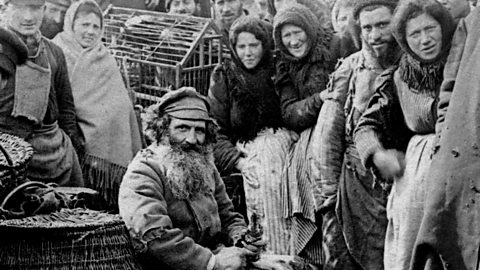Equality and inequality

In Animal Farm, Orwell uses the animals and their actions to make the reader think about equality and inequality. Before 1917, the majority of Russian people suffered from great inequality - they had far less money and food than the ruling classes.
Likewise, before the rebellion in Animal Farm Mr Jones takes everything that the animals have away from them. After the Rebellion the animals are free from the tyranny of Mr Jones and seek to establish equality amongst themselves.
One of the Commandments is 'All animals are equal'. However, this equality is short-lived and the pigs begin to bend the rules until inequality returns to the farm.
How is the theme of equality and inequality shown in the novel?
In Animal Farm, Orwell explores equality and inequality through:
- the inequality between the animals and mankind
- the equality that the animals seek to establish after the rebellion
- the inequality that begins again after the pigs take control
| How does Orwell show this? | Evidence | Analysis | |
| Animals and mankind | During Old Major's speech he talks about how 'no animal is free' and that life for them is 'one of slavery' and that 'man is the only creature who consumes without producing'. | "Man serves the interest of no creature except himself." | This short and blunt sentence shows Old Major's opinion about the inequality between men and animals. |
| The rebellion | After the rebellion, the animals agree on Seven Commandments that they will now live by - to make sure everything is fair and equal. | "All animals are equal." | A simple sentence but hugely effective. There is no room for argument or debate here - the intention of the animals is very clear. |
| The pigs taking control | When the pigs take control they move into the farmhouse and sleep in beds - creating inequality between themselves and the other animals. | "You would not rob us of our repose, would you, comrades? You would not have us too tired to carry out our duties? Surely none of you wishes to see Jones back?" | Squealer argues here that without 'repose' the pigs can't carry out their work and so Mr Jones will return. Squealer uses personal pronouns to create a difference between the pigs and the other animals. |
| Animals and mankind | |
|---|---|
| How does Orwell show this? | During Old Major's speech he talks about how 'no animal is free' and that life for them is 'one of slavery' and that 'man is the only creature who consumes without producing'. |
| Evidence | "Man serves the interest of no creature except himself." |
| Analysis | This short and blunt sentence shows Old Major's opinion about the inequality between men and animals. |
| The rebellion | |
|---|---|
| How does Orwell show this? | After the rebellion, the animals agree on Seven Commandments that they will now live by - to make sure everything is fair and equal. |
| Evidence | "All animals are equal." |
| Analysis | A simple sentence but hugely effective. There is no room for argument or debate here - the intention of the animals is very clear. |
| The pigs taking control | |
|---|---|
| How does Orwell show this? | When the pigs take control they move into the farmhouse and sleep in beds - creating inequality between themselves and the other animals. |
| Evidence | "You would not rob us of our repose, would you, comrades? You would not have us too tired to carry out our duties? Surely none of you wishes to see Jones back?" |
| Analysis | Squealer argues here that without 'repose' the pigs can't carry out their work and so Mr Jones will return. Squealer uses personal pronouns to create a difference between the pigs and the other animals. |
Analysing the evidence
Question
How does Orwell explore equality and inequality in Animal Farm?
- The inequality that exists between the animals and Mr Jones - Mr Jones spends his time drinking whilst the animals go unfed. He is the only one who profits from their hard work.
- When the animals chase Mr Jones away, there is a chance for equality after the rebellion - 'All animals are equal' is one of the Commandments the animals decide on. There are hints that this sort of equality might be hard to establish - the animals arenât sure whether to include the rats in their comradeship and the pigs clearly have a better quality of life than the other animals, even under the rule of Mr Jones.
- The chance for equality is lost when the pigs come to power - they start to change the rules, they take more food and enjoy more leisure time until life on the farm is filled with just as much inequality as before the rebellion.